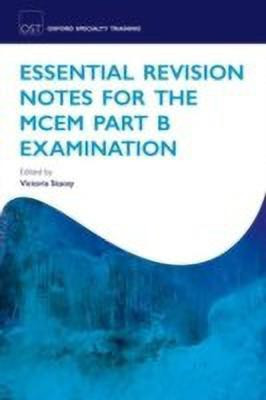Revision Notes for MCEM Part B(English, Paperback, Stacey Victoria)
Quick Overview
Product Price Comparison
The only book needed to pass the MCEM exam Part B Framed around the College of Emergency Medicine syllabus Includes over 35 sample short answer questions Exam tips throughout the book Highlights subjects that have appeared in previous short answer questions. This is the only book that MCEM candidates will need to pass the MCEM Part B exam. This revision guide is framed around the most recent CEM syllabus, focusing on all the components of the exam. Each section of the book is tailored to match different elements of the syllabus, allowing candidates to revise efficiently and comprehensively. This concise revision tool is completely up-to-date, reflecting the latest developments in the examination. High quality artwork and a bullet-point style help candidates to absorb information quickly. It also includes over 35 short answer questions enabling candidates to gain invaluable exam practice. Exam tips are included throughout the book to help candidates improve their exam technique. About The Author Victoria Stacey has been a Consultant in Emergency Medicine at Cheltenham General Hospital since August 2009. She passed the MCEM examination in 2004 and the FCEM examination in 2008. She trained as a Specialist Registrar in the Oxford Deanery and during that time ran a revision course for the MCEM part B and C examinations. She has prepared hundreds of candidates for the MCEM examination as part of teaching on the revision course and in her role as an Educational Supervisor. She has experienced firsthand the problem many candidates have of finding resources to help prepare for the exams and have been asked numerous times to recommend books that candidates can use to revise. She wrote the revision guide for the MCEM Part B examination to help address this need. In writing the revision guide she has tried to create the book she wished she had when preparing for the MCEM and FCEM examinations. Table Of Contents 1: Exam tips 2: Resuscitation 3: Anaesthetics and pain relief 4: Major trauma 5: Musculoskeletal, rheumatology and wound management 6: Surgery 7: Surgical sub-specialities 8: Obstetrics and gynaecology 9: Cardiology 10: Respiratory 11: Neurology 12: Nephrology 13: Gastroenterology 14: Endocrinology 15: Infectious diseases 16: Dermatology 17: Toxicology 18: Psychiatry 19: Paediatrics 20: Legal aspects of emergency medicine


